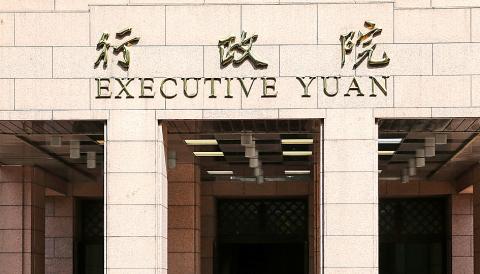The Executive Yuan has drafted an amendment to extend the period during which retired generals would be prohibited from traveling to China in an apparent response to two retired generals praising Chinese President Xi Jinping (習近平) at a political event in China last year.
The Executive Yuan on Thursday said it has drafted an amendment to the Act Governing Relations Between the People of the Taiwan Area and the Mainland Area (台灣地區與大陸地區人民關係條例) to extend the period during which former generals, mayors, science officials and intelligence officers must obtain Ministry of the Interior approval before they can travel to China to 15 years from three years.
The proposed amendment aims to prevent retired government and military officials from attending events in China that could unduly assert Chinese sovereignty over Taiwan, the Executive Yuan said.

Photo: CNA
The Chinese Communist Party’s (CCP) official People’s Daily on Jan. 29 reported that two retired Taiwanese generals, Huang Shing-chiang (黃幸強) and Chen Ting-chung (陳廷寵) in December last year attended the Cross-Strait Generals Forum in Xiamen in China’s Fujian Province.
The report was written by former Chinese-language People’s Liberation Army Daily president Huang Guozhu (黃國柱) and was titled: “Look over here, Taiwanese generals: Commemorating the 40th anniversary of the Message to Compatriots in Taiwan.”
At the event, Taiwanese generals discussed “reform and liberalization to jointly pursue development” with their Chinese counterparts, sang the Chinese national anthem and joined others in issuing an “initiative for peaceful unification,” the report said.
The generals also praised the “five points” that Xi mentioned in an address on Jan. 2, it said.
The paper quoted them as saying that China’s transformation to a more liberal economy has brought “tremendous benefits” to Chinese and Taiwanese, and that they endorsed the so-called “1992 consensus” and Beijing’s “one China” principle.
Huang was quoted as saying that “the hope of cross-strait unification must not evaporate. This is our shared goal as Chinese and members of the Zhonghua minzu [Chinese ethnic group, 中華民族].”
“When the development of Chinese culture reaches its climax, our nation shall be at its most powerful. Turning one’s back on Chinese culture would be forcing one’s self into oblivion,” Chen said, according to the report.
When reached for comment, Democratic Progressive Party Legislator Tsai Shih-ying (蔡適應) on Saturday said that soldiers have a duty to protect the nation, so if they ingratiate themselves with China, it would defeat the purpose of having a military.
Retired generals who ingratiate themselves with China do not deserve a pension, he added.
The “1992 consensus,” a term former Mainland Affairs Council chairman Su Chi (蘇起) in 2006 admitted to making up in 2000, refers to a tacit understanding between the Chinese Nationalist Party (KMT) and the CCP that both sides of the Taiwan Strait acknowledge there is “one China,” with each side having its own interpretation of what “China” means.

CHAOS: Iranians took to the streets playing celebratory music after reports of Khamenei’s death on Saturday, while mourners also gathered in Tehran yesterday Iranian Supreme Leader Ayatollah Ali Khamenei was killed in a major attack on Iran launched by Israel and the US, throwing the future of the Islamic republic into doubt and raising the risk of regional instability. Iranian state television and the state-run IRNA news agency announced the 86-year-old’s death early yesterday. US President Donald Trump said it gave Iranians their “greatest chance” to “take back” their country. The announcements came after a joint US and Israeli aerial bombardment that targeted Iranian military and governmental sites. Trump said the “heavy and pinpoint bombing” would continue through the week or as long

TRUST: The KMT said it respected the US’ timing and considerations, and hoped it would continue to honor its commitments to helping Taiwan bolster its defenses and deterrence US President Donald Trump is delaying a multibillion-dollar arms sale to Taiwan to ensure his visit to Beijing is successful, a New York Times report said. The weapons sales package has stalled in the US Department of State, the report said, citing US officials it did not identify. The White House has told agencies not to push forward ahead of Trump’s meeting with Chinese President Xi Jinping (習近平), it said. The two last month held a phone call to discuss trade and geopolitical flashpoints ahead of the summit. Xi raised the Taiwan issue and urged the US to handle arms sales to

State-run CPC Corp, Taiwan (CPC, 台灣中油) yesterday said that it had confirmed on Saturday night with its liquefied natural gas (LNG) and crude oil suppliers that shipments are proceeding as scheduled and that domestic supplies remain unaffected. The CPC yesterday announced the gasoline and diesel prices will rise by NT$0.2 and NT$0.4 per liter, respectively, starting Monday, citing Middle East tensions and blizzards in the eastern United States. CPC also iterated it has been reducing the proportion of crude oil imports from the Middle East and diversifying its supply sources in the past few years in response to geopolitical risks, expanding

Pro-democracy media tycoon Jimmy Lai’s (黎智英) fraud conviction and prison sentence were yesterday overturned by a Hong Kong court, in a surprise legal decision that comes soon after Lai was jailed for 20 years on a separate national security charge. Judges Jeremy Poon (潘兆初), Anthea Pang (彭寶琴) and Derek Pang (彭偉昌) said in the judgement that they allowed the appeal from Lai, and another defendant in the case, to proceed, as a lower court judge had “erred.” “The Court of Appeal gave them leave to appeal against their conviction, allowed their appeals, quashed the convictions and set aside the sentences,” the judges